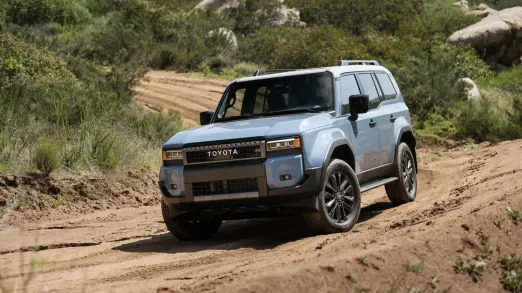BARRETT JUNCTION, Calif. – This may be our literal first drive of the all-new 2024 Toyota Land Cruiser, but we’ll be trying to get one for a more substantive test as soon as possible. Our drive was restricted to a few laps of a specially created off-road course, and not even an especially long one, plus a half-hour of road time on a winding rural highway with long sweepers and hefty grades. In short, this was not the venue for a thorough or fair evaluation, even within the usually limited scope of a typical first drive event.
The story of the 2024 Land Cruiser also got a lot more complicated because of what happened the night before our drive: The equally all-new 4Runner was unveiled. While 4Runner pricing won’t be announced until the fall, the current generation would suggest that the 2025’s hardcore off-roading trim levels should be in the same ballpark as the Land Cruiser’s starting price of $57,345. Considering those trim levels share the Land Cruiser’s new body-on-frame platform, strong hybrid powertrain, have similar dimensions and provide far more equipment, both of the mechanical and creature comfort variety … well, why get the Land Cruiser?
Toyota describes that entry-level “Land Cruiser 1958” as a “blank canvas” for more dedicated off-roaders who want to make their rig their own. Seats are covered in a sturdy fabric, door and dash surfaces are rock-hard plastic, frills are kept to a minimum and options are scarce. You can’t get the new manually disconnecting stabilizer bar, skid plates or roof rails, including the latter as an accessory. This DIY concept seemed intriguing when the new Land Cruiser was unveiled, and there could definitely be those happy to spend $6,000 less than the starting point of the upper “Land Cruiser” trim level. However, I would contend the disconnecting stabilizer bar is hardly a frill, and they’d get that, plus a whole bunch of other hardware in the new 4Runner TRD Pro or Trailhunter – hardware they wouldn’t have to spend money adding to a stripper Land Cruiser.
I kept asking various Toyota representatives some variation of, “What are the reasons someone might choose a 1958 instead of a 4Runner TRD Pro or Trailhunter?” No one could point to a spec, feature, demographic, use case or general objective reason. Eventually, though, one decidedly subjective answer started to shine through: People who want a Land Cruiser will want a Land Cruiser. The objective points in the 4Runner’s favor won’t really matter, much as they didn’t when someone chose (or chooses on the used market) the flawed but unquestionably lovable FJ Cruiser. It’s all about style and character. A 4Runner is a 4Runner, and 4Runner people are going to want one of those. Land Cruiser people will want a Land Cruiser, and hey, if they’re swayed by all that objective stuff to get a 4Runner instead, they still bought a Toyota. A dollar here, a dollar there. Fair enough.
That’s not the last 1958 quandary, however. On the subject of style, you may have noticed that the 1958 has round LED headlights and plain black trim everywhere on the fascia, while the upgrade “Land Cruiser” has a collection of rectangular LED elements and a mixture of body-color and alloy-look trim. The one-year-only First Edition (pictured below in beige) combines the round headlights with the rest of the upgrade Land Cruiser fascia. Judging by internet response and my fellow attendees at the press launch, the retro round headlights are greatly preferred. Based on some whispers, nudges and winks at the first drive event, don’t be surprised if demand results in a headlight option of some sort once the First Edition is sunset.
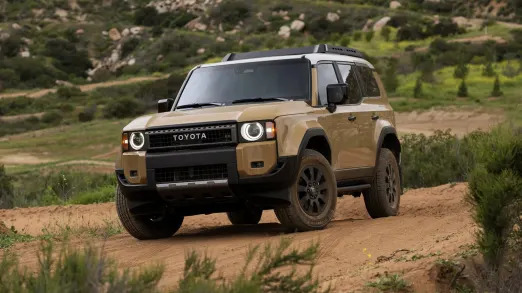
Every Land Cruiser gets the same “i-Force Max” hybrid powertrain combination of 2.4-liter turbo inline-four, eight-speed automatic and electric motor that produces 326 horsepower and 465 pound-feet of torque. My quick, grade-heavy jaunt did it no favors, but this performance-oriented hybrid seems abundantly up to the task of moving a little over 5,000 pounds of Land Cruiser. That’s about 800 less than the old version, which had a 5.7-liter V8 with a few more horses, a lot less torque and 2,100 more pounds of towing capacity. It also got 14 miles per gallon combined. The new one gets 23 mpg combined, which also blows away the turbo V6 in the Lexus GX (effectively the Land Cruiser’s fancy twin) that gets 17 mpg combined. The GX isn’t that much more powerful than the Land Cruiser, so I’d say that even though the four-cylinder produces quite a bit of uncouth buzz, the LC’s fuel economy advantage would still outweigh the GX’s performance one.
The long sweepers of my short drive revealed road holding to be commendable given the body-on-frame structure, off-road-oriented suspension and high-profile all-season tires of the 1958 I drove. Body roll isn’t excessive, steering is precise with appropriate weighting (if there’s some added in Sport mode, I didn’t really notice), and the well-sorted damping didn’t have the body bounding about in mid-corner bumps. That said, there’s no escaping the fact it’s a body-on-frame truck. There are the telltale wiggles and jiggles over bumps, and much like the mechanically related Sequoia, I would suspect that the available 20-inch wheels may amplify that sensation.
Off road, the key differentiator between Land Cruiser versions is the presence of the new manually disconnecting stabilizer bar that improves wheel articulation. Although the e-KDSS system in the Lexus GX Overtrail is a more sophisticated automated disconnect system with benefits both on- and off-road, it’s also more complicated and makes it harder (and more expensive) for those hoping to modify their suspension. The manual disconnection is better for that, and it still does wonders while traversing the various lopsided off-road events Toyota created for the course. Like this …
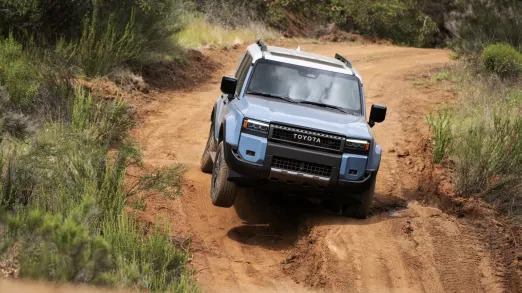
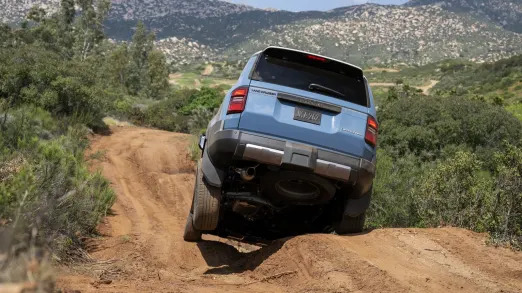
To be clear, the 1958 was still able to make it through, but there was more lateral rocking and body movement. The “Land Cruiser” trim level also gets Multi-Terrain Select off-road drive modes added to the standard Crawl Control low-speed off-road cruise control and hill-descent control.
Every 2024 Land Cruiser gets a full-time four-wheel-drive system, which effectively equates to all-wheel drive with a low-range selected by pushing a thick toggle on the center console down and back toward 4WD Low. Next to that are buttons for the electronically locking center and rear differentials, and the stabilizer bar. A multi-purpose knob wheels through on-road drive modes and, if so equipped, the Multi-Terrain Select options.
Ground clearance stands at 8.7 inches, with approach, breakover and departure angles of 31 degrees, 25 degrees and 22 degrees, respectively. The 1958 has slightly worse approach of 30 degrees due to its different wheel/tire package, which I suppose those DIYers will chuck anyway. All of the above are worse than the current 4Runner, but all but the approach angle are better than the last, old-school Land Cruiser (32/24/21 degrees). It should also be said that the new Land Cruiser’s much smaller dimensions (4.4 inches narrower, 2.1 shorter in length), make for much easier off-roading on tighter trails. It’s not quite swapping an elephant for a horse, but it’s close. Visibility is also exceptional, with its tall, upright windshield and flat, squared-off hood that make the view out of the new 2025 4Runner seem like a pillbox by comparison. Should that not be enough, all but the 1958 include a variety of camera views (although it would be nice if they stayed on at speeds a few ticks higher than 9 mph).
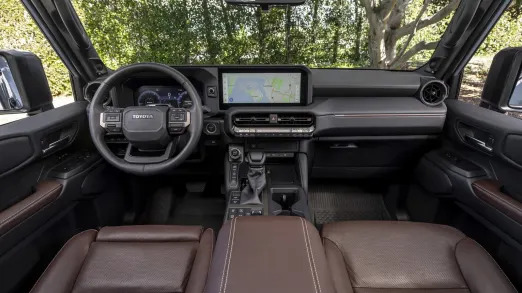
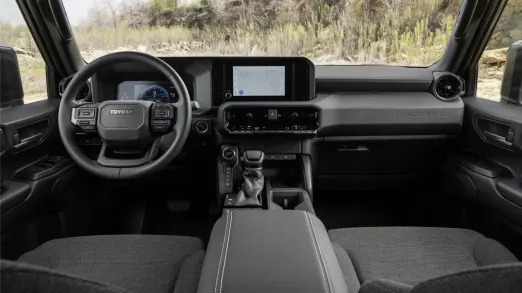

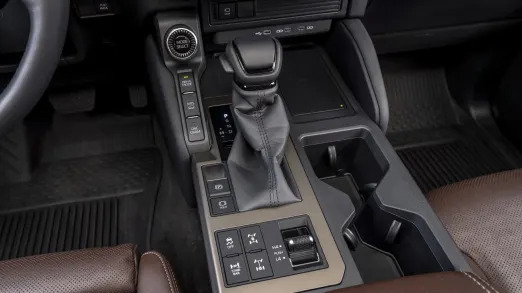
As mentioned above, interior quality differs wildly between the 1958 and upper “Land Cruiser” trim (the First Edition is the same as the latter). The 1958’s cloth is quite nice with a certain retro quality to its look and feel, but all the hard plastic is rough – literally and figuratively. Even the door armrests are unpadded plastic. Ouch. You also get an 8-inch touchscreen and a much smaller instrument display than the vibrant, multi-view 12.3-inch unit in the other trims. Those also get a 12.3-inch touchscreen, though it effectively runs the same interface. The upper trims also get padded door and dash surfaces (and armrests) covered in SofTex simulated leather, resulting in a cabin that looks and feels the part of something costing more than $60,000. The design is also less severe and, well, Tacoma-like than the new 4Runner’s, providing an altogether stronger answer for “Why Land Cruiser instead of 4Runner?” Of course, you also have to pay more.
In terms of space, I’m 6-foot-3, and had no problem getting comfortable up front with either the 1958’s manual seats or the other trims’ power ones. I found front legroom in the old Land Cruiser to be tight. I could sit comfortably behind myself in the new Land Cruiser with a finger-width to spare between knees and front seat back. Headroom is more abundant than the 4Runner’s, while the seatback reclines generously. Cargo space suffers due to the hybrid system’s battery pack that raises the floor by roughly a hand-width, leaving a small, full-width bin at the cargo area’s trailing edge. Toyota didn’t provide cargo capacity, but considering that the Lexus GX’s third-row seat raises its cargo floor by a similar amount, I would suspect the Land Cruiser to have roughly the same 40 cubic feet. That’s huge, and the boxy shape should make cargo loading a breeze.
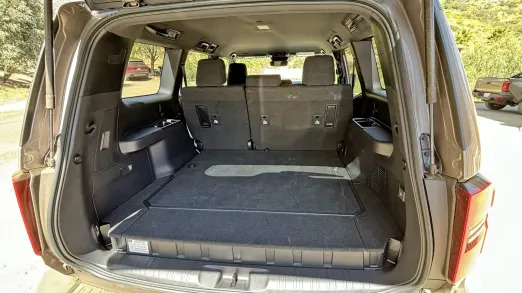
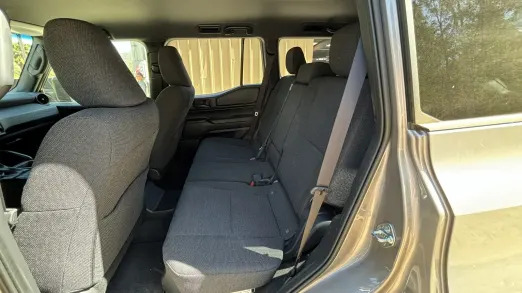
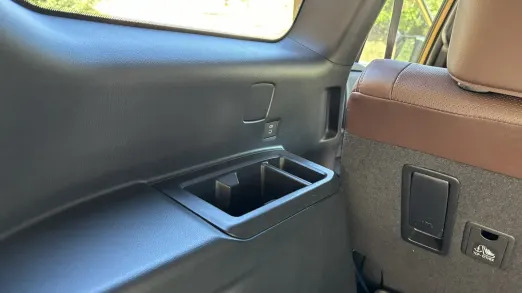
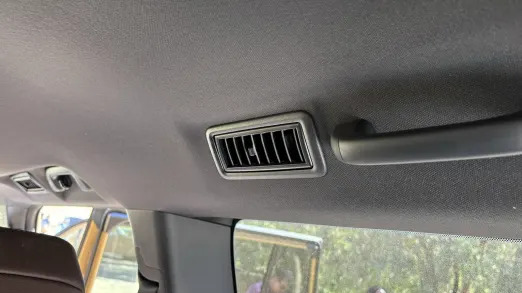
Speaking of a third-row seat, though, the Land Cruiser does not offer one, at least in this market. But because it does in other places and, again, shares so much with the GX, there are still air vents, armrests, USB ports and cupholders in the cargo area along with grab handles to help hoist you out of a third row that doesn’t exist. Does this matter? Not really, and I suppose your cargo will be kept cool. It can also be powered by a 2,400-watt inverter back there.
As stated at the very beginning, there’s a lot more to learn about the new 2024 Toyota Land Cruiser. While it proved itself on a trail that seemed fairly analogous to typical off-road use (no insane boulder fields were traversed), we still need to make the sort of drive on-road you’d make to get to the trail in the first place. Not to mention more day-to-day driving, but then that’s rarely discovered on a first drive event. One thing we won’t be able to determine for years or even decades: how this smaller, lighter, hybrid-powered and supposedly less robustly built Land Cruiser will compare in the long run to past generations that are still traversing the Sahara, Andes and elsewhere with the sterling build quality and bulletproof reliability that made the Land Cruiser name legendary. You can, in fact, get a next-generation one of those, it’s just exclusively the Lexus LX here in the States. And if you’re iffy on frills, that definitely won’t be for you. No quandary there.
Until the second drive, then …

